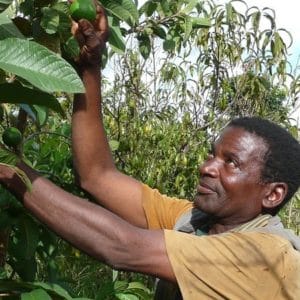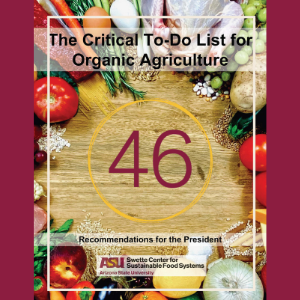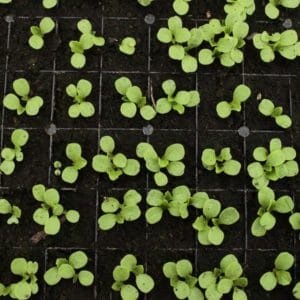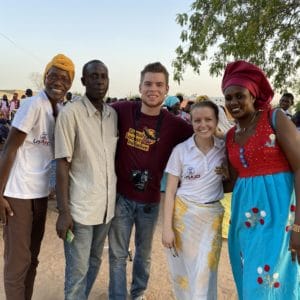Sept. 2: Food. Nature. People.
SDG 2 - Zero Hunger

Sept. 2: Food. Nature. People.
ASU’s Swette Center for Sustainable Food Systems is a partner in this international, virtual and free event, which will provide actionable scientific evidence to fundamentally transform agriculture and land management.

Swette Center report sets organic food agenda for US
The ASU Swette Center for Sustainable Food Systems recently released a report to help President Joe Biden set a new agriculture agenda based to organic foods. “The Critical To-Do List

New Report: The Critical To-Do List for Organic Agriculture
The goal of this report is to present the Biden-Harris Administration a list of easily achievable actions to immediately power-boost organic agriculture. The President has the power TODAY to implement most, if not all of elements of 36 recommendations; action on 10 recommendations depends on Congress.

How 'food security' is quickly becoming national security
Daniel Sarewitz, editor-in-chief of Issues in Science and Technology, moderated a webinar to discuss the weaknesses in our food supply systems and the future threats the country faces as we work to strengthen those systems.
Recap: Measuring impact using the Sustainable Development Goals framework
On Wednesday, March 24, Project Cities Program Manager Steve Russell was joined by Dr. Gregory Broberg, community partners Tracie Hlavinka (Town of Clarkdale) and Jay Davies (City of Peoria),

Video: Environmental Humanities Initiative distinguished lecture with Elizabeth Hoover
A recording of the Environmental Humanities Initiative’s 2020 distinguished lecture with Elizabeth Hoover is now available, along with a video of the lecture discussion, at the Institute for Humanities Research YouTube channel.

Like marathon runners, locusts carbo-load before a long journey
According to a new study from ASU's Global Locust Initiative scientists, they do it for the same reason humans do. Read the abstract of this new paper published Aug. 2 in the Journal of Animal Ecology.
Center for Global Health research focuses on food insecurity during crisis
The center identifies a key theme each year, one that they believe can reinvent and reimagine global health. This year's focus is on the human experience of food insecurity, and how it is worsened by illness and other crises.
Byck documentary series Carbon Cowboys hits the web
In his series, Byck details the farming technique known as regenerative grazing, which involves quickly rotating cattle from pasture to pasture, before they can damage the land.

Welcome to vertical farming
Experts are in agreement that one of the most effective ways to combat climate change is through an overhaul of our food system. Arizona State University chemistry instructor Zhihao Chen

MSUS student travels to Senegal to help workshop locust booklets
This article was written by William H. Walker VI, a sophomore in the School of Sustainability. Edited December 2, 2020 by Alana Burnham. From left to right: Team members Fatou
NSF CAREER awarded to Arianne Cease
Most CAREER awards are given on second or third submissions. For Cease, the third submission was the charm. Junior faculty interested in applying for a CAREER award should contact the Global Futures Laboratory Research Development Office.